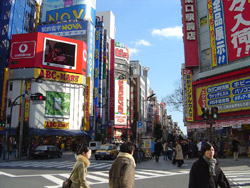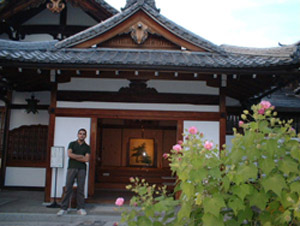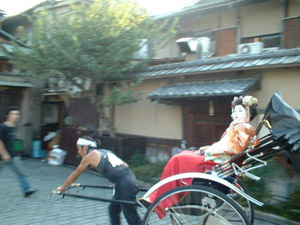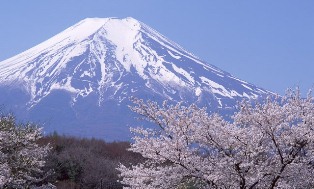| |
Οι Εμπειρίες του κ.Χριστόπουλου |
|
| |
- “Is that an ‘L' as in "Rome?"
- "No, it's an ‘R', as in "London"
A world of misunderstandings awaits all those who choose to go to Japan carrying their national preconceptions of "normalcy". I fell into a string of traps upon arrival. But, first things first: As an 18 year-old Law student I decided to pursue a long time goal and learn Japanese, unaware at the time of how this would prove to be the most critical decision I would ever have to make. One thing lead to another and at age 21 I found myself a grantee of a Japanese Government scholarship program, to spend a month in Japan, studying the language and traveling around the country. Coming back, I remember telling my Japanese language teacher: "We'll go on with the language courses, but going back to study for longer time is a non-issue". But, as the saying goes, when people make plans, God laughs. Having won the Japanese Language Speech Contest, earned a string of diplomas and distinctions I was so proud about, and with a law degree in my hands, I earned the MEXT scholarship; I packed my stuff, my hopes and my fears and, before I knew it, I was landing in Tokyo. I was crashing in Tokyo, to be more accurate. |
 |
A series of cultural shocks. mutual misunderstandings and the alienation one might feel as a westerner in Japan were my first impressions; together with the exorbitant prices (“Hmmm, may be I'm not that hungry after all”, I thought during my first visit to a super market). I was determined to give everything up within a month, if I didn't like it. And I ended up staying for about 4 years.
Practical issues: The MEXT scholarship has it all. The allowance is enough to make a living –during the first 2 years that one is allowed to stay at one of the dorms. By the time you have to move out you are connected well enough to be able to get involved in a series of part time jobs that will make your life quite comfortable and relaxed. My advice? Ask those who are there before you; they already know their way around. I did the same for those who came after me; solidarity is the gateway to survival.
|
 |
Japanese Universities are very well organized and most have very close links with the Monbusho, so there are ISO-type procedures for just about everything you might need to ask or do. Usually, a secretary in each University is in charge of MEXT scholars, so he or she will be your eyes to formalities and procedures, in order to avoid bloopers and never miss out on things you absolutely have to do. Rule of thumb? Ask. Ask about everything you want to know about and don't be afraid to make mistakes in the language; speaking Japanese at any level will make your life a lot easier. From paying bills to opening a bank account, getting a cell phone or renting an apartment, speaking Japanese could be the thin line between heaven and hell; although the Japanese people are always more than happy to use their English to help you out. A useful tip could be to carry on you a portable electronic dictionary; it's light and it could sometimes save you, while you can also look up unknown words and kanji during your daily commute. |
 |
And another thing: if you buy a second hand bike, make sure you register it to the Police; otherwise, you could end up being interrogated at some police headquarters. Trust me. For more on practicalities, though, read the AIEJ's “Student Guide to Japan” at http://www.in32.com/AIEJ/study_j/sgtj_e.html . Also, use the helpful material available at the library of the Japanese Embassy in Athens. It will answer most of your questions. And do talk to former scholars before you go. They will tell you everything books won't.
One more advice: always cooperate with your supervising professor; he or she can be the A and Z in your studies and could determine their outcome. In the meantime, don't forget that the Japanese people always appreciate us foreigners respecting their culture, their habits, their modus vivendi, and speaking (or even trying to speak) their language will get you even further. And always remember that we are guests in a foreign country, we are the outsiders, and we should show respect; you might not have to always abide, but do show respect. In my view, bowing, politeness and using phrases such as o-negai shimasu, sumimasen and o-sewa ni narimashita, are always appreciated and they won't harm you anyway. To make a long story short, if you have to remember one thing upon arrival and during your stay, in my view it should be this: be flexible ; I learnt all this through trial and error, although in theory I knew it all in advance. |
 |
The good times and the bad times I went through all contributed to getting to know better and to appreciating the psyche of the Japanese people. In my life, my friends and my travels have always been my most precious luggage and, thankfully, I was blessed with plenty of both, thanks to this experience. Making foreign friends can be easier but making Japanese friends is unique and very rewarding, while it can give you insights that you could hardly imagine. Traveling around Japan and in the greater Asia-Pacific region has been one of the highlights of my experience. From backpacking in Tibet and sun-worshipping in Thailand, to Christmas in Hawai'i and clubbing in California, my trips were endless, and so can be yours (air fares can be very cheap, but book well in advance). In Japan, don't miss out on the autumn red leaves in Kyoto, skiing in Hokkaido, climbing Mt. Fuji to the top all night until dawn, the traditional ryokan (Japanese-style hostel) experience or a self-rewarding bath at a rotenburo (open-air public bath) at any snowy mountain in winter. |
 |
With a Master's degree in International Relations from Waseda University in Tokyo, and with a Ph.D. on the way in International Studies focused on Asia, I decided to settle back down in Greece, and now I am working at the Hellenic Ministry of Foreign Affairs as an Expert Counselor on EU-Asia relations.
|
So, my advice will be, go for it. You will soon thank yourself you did. I had already traveled a lot before I went to Japan, but this has been the most eye-opening and soul-shaping experience in my life so far. Needless to say, my studies in Japan and my Asian experience were a sine qua non for the boost in my career and I can't be thankful enough to my Japanese language teacher and to my family, who have been my guides and inspiration all through these years, as well as to Monbusho and the Japanese Embassy in Athens for giving me this opportunity. I also need to thank so many people in Japan for everything we've shared and for lifting me up every time I felt like giving up. But most of all, I dedicate everything I achieved to life itself, for all the experiences and the surprises it offered me and for those that await me ahead. |
|
[ 1] Taken from the book Gems of Japanized English: “Is that ‘L' as in ‘Rome'? “No, it's ‘R' as in ‘London' ”, by Miranda Kendrick and Motomi Naito, Tuttle Publishing, 1989.
←
Εμπειρίες Αποφοίτων
|
|
|
|
